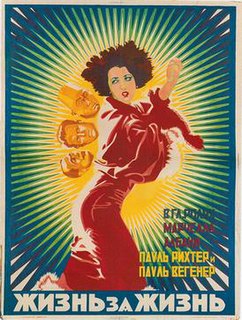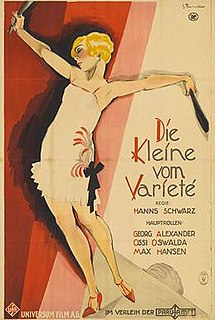Related Research Articles

Die Fledermaus is a 1962 Austrian musical film directed by Géza von Cziffra and starring Peter Alexander, Marianne Koch and Marika Rökk. It is an adaptation of the operetta Die Fledermaus by Johann Strauss II, Karl Haffner and Richard Genée.

The Hound of the Baskervilles is a 1921 British silent mystery film directed by Maurice Elvey and starring Eille Norwood, Catina Campbell and Rex McDougall. It is based on the 1902 Sherlock Holmes novel The Hound of the Baskervilles by Arthur Conan Doyle. It was made by Stoll Pictures, Britain's largest film company at the time. It was the first British film adaptation of the famous novel.
Max Mack (1884–1973) was a German screenwriter, film producer and director during the silent era. He is particularly known for his 1913 film The Other. He directed, and co-starred in, an early film adaptation of Dr. Jekyll and Mr. Hyde in 1914, called Ein Seltsamer Fall, written by Richard Oswald. During the 1910s, he directed nearly a hundred films in a variety of different genres.

The Hound of the Baskervilles is a 1929 German silent mystery film directed by Richard Oswald and starring Carlyle Blackwell, Alexander Murski, Livio Pavanelli. The film is an adaptation of the 1902 Sherlock Holmes novel The Hound of the Baskervilles by Arthur Conan Doyle. It was the last Sherlock Holmes adaptation in the silent film era. The film boasted an unusually international cast, including American actor Carlyle Blackwell, German actor Fritz Rasp, Russian actor Alexander Murski and Italian actor Livio Pavanelli.

Lucrezia Borgia is a 1922 German silent historical film directed by Richard Oswald and starring Conrad Veidt, Liane Haid, Paul Wegener, and Albert Bassermann. It was based on a novel by Harry Sheff, and portrayed the life of the Renaissance Italian aristocrat Lucrezia Borgia (1480–1519). Botho Hoefer and Robert Neppach worked as the film's art directors, designing the period sets needed. It was shot at the Tempelhof Studios in Berlin. Karl Freund was one of the cinematographers. Famed French director Abel Gance remade the film in 1935.

Sabine Impekoven was a German film actress of the silent era. She was married to the actor Leo Peukert and appeared alongside him in several films. She was the sister of Toni Impekoven.
The Women's War is a 1928 German silent film directed by Franz Seitz and starring Fritz Kampers, Liane Haid and Lotte Lorring. It is based upon the play by Ludwig Anzengruber.
Malaria is a 1919 German silent film directed by Rochus Gliese and starring Lyda Salmonova, Emil Kühne, and Ewald Bach.

Dagfin is a 1926 German silent film directed by Joe May and starring Paul Richter, Alfred Gerasch and Marcella Albani.
The Ascent of Little Lilian is a 1925 German silent film directed by Fred Sauer and starring Maria Zelenka, Bruno Kastner and Georg Baselt.

Ingeborg is a 1960 West German comedy film directed by Wolfgang Liebeneiner and starring Ingrid Ernest, Dietmar Schönherr and Walter Giller.

The Little Variety Star is a 1926 German silent comedy film directed by Hanns Schwarz and starring Ossi Oswalda, Georg Alexander and Max Hansen.

The Tempelhof Studios are a film studio located in Tempelhof in the German capital of Berlin. They were founded in 1912, during the silent era, by German film pioneer Alfred Duskes, who built a glass-roofed studio on the site with financial backing from the French company Pathé. The producer Paul Davidson's PAGU then took control and constructed a grander structure. The First World War propaganda drama The Yellow Passport, the historical comedy Madame DuBarry and the expressionist 1920 silent film The Golem were made there by PAGU.
Alfred Duskes (1881-1918) was a German film producer and director. He was one of the German pioneers of the silent era, setting up his first production company in 1905. In 1912 he founded the original Tempelhof Studios, with financial backing from the French company Pathé.

Everyone Asks for Erika is a 1931 German musical comedy film directed by Frederic Zelnik and starring Lya Mara, Alexander Murski and Walter Janssen.

The Blue Lantern is a 1918 German silent drama film directed by Rudolf Biebrach and starring Henny Porten and Ferdinand von Alten.

Wanda Treumann (1889-1963) was a German film actress and producer of the silent era. A leading lady in a number of productions during the Imperial era and the Weimar Republic, she retired from the screen in 1922. Her later life remains obscure.

The New Paradise is a 1921 German silent film directed by Willy Zeyn and starring Esther Carena, Max Adalbert and Arthur Bergen.

Love, Summer and Music is a 1956 Austrian-German musical comedy film directed by Hubert Marischka and starring Joe Stöckel, Fritz Heller and Rudolf Wasserlof.
William Kahn (1882–1959) was a German screenwriter, film producer and director of the silent era.
References
- ↑ Elsaesser & Wedel p.305
- ↑ Workman, Christopher; Howarth, Troy (2016). "Tome of Terror: Horror Films of the Silent Era". Midnight Marquee Press. p. 222. ISBN 978-1936168-68-2.